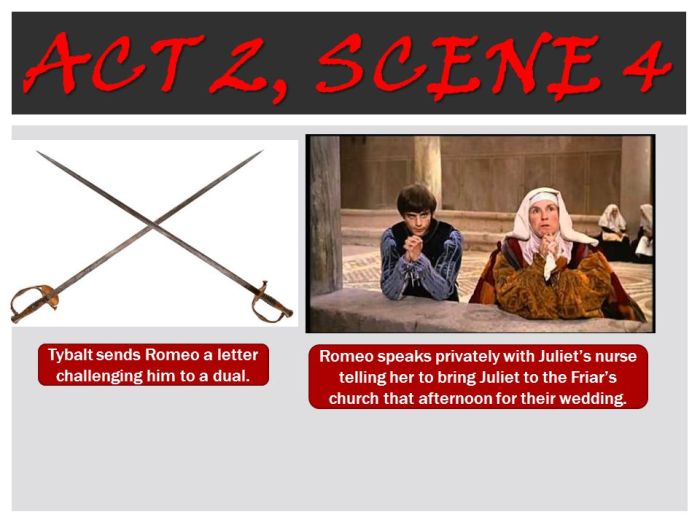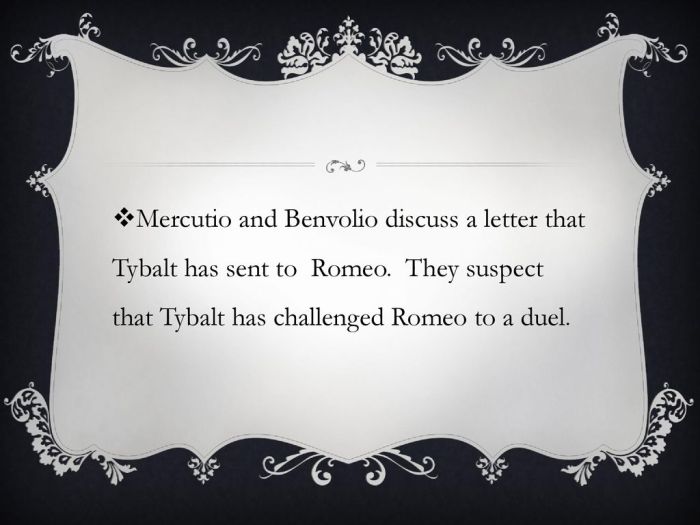Tybalt has sent a letter to Romeo that says, “I challenge you to a duel.” This letter sets in motion a chain of events that leads to the tragic deaths of Romeo and Juliet. In this essay, we will explore the motivations behind Tybalt’s letter, Romeo’s response, and the escalation of conflict that ultimately leads to the play’s tragic conclusion.
Tybalt is a hot-headed and impulsive young man who is quick to take offense. He is also deeply loyal to his family, the Montagues, and he sees Romeo as a threat to their honor. When Romeo attends the Capulet’s party uninvited, Tybalt is enraged and demands that he be killed.
Context and Introduction

Romeo and Juliet, a tragic play by William Shakespeare, revolves around the star-crossed lovers from feuding families, the Montagues and Capulets. Romeo Montague and Tybalt Capulet, Juliet’s fiery cousin, epitomize the intense rivalry between the two households.
The letter that Tybalt sends to Romeo serves as a pivotal moment in the play. It ignites a chain of events that ultimately leads to the tragic deaths of both Romeo and Juliet.
Tybalt’s Motivations

Tybalt’s hatred for Romeo stems from the deep-seated animosity between the Montagues and Capulets. He views Romeo’s presence at the Capulet ball as an act of disrespect and a threat to his family’s honor.
Tybalt’s sense of honor and pride dictates his actions. He believes that he must defend his family’s reputation by challenging Romeo to a duel.
Romeo’s Response

Romeo is initially reluctant to fight Tybalt, as he is deeply in love with Juliet and does not wish to harm her family.
However, when Tybalt insults Romeo and his family, Romeo’s honor is compromised. He feels compelled to defend himself and the Montague name.
Romeo’s decision to confront Tybalt has dire consequences, as it ultimately leads to his own death and the death of Tybalt.
The Escalation of Conflict
The letter from Tybalt serves as a catalyst for the escalating violence between the Montagues and Capulets.
Romeo’s decision to duel Tybalt leads to a chain of events that includes the deaths of Mercutio and Tybalt. This, in turn, prompts Romeo to kill Tybalt’s uncle, resulting in his banishment from Verona.
The play explores the role of fate and free will in the characters’ actions. While the feud between the families sets the stage for tragedy, the characters’ own choices ultimately determine their destiny.
Literary Analysis

The letter from Tybalt foreshadows the tragic events to come. It is a written threat that sets in motion the chain of events that leads to the deaths of the main characters.
The letter is also a symbol of the deep-seated hatred and rivalry between the Montagues and Capulets. It represents the insurmountable obstacles that Romeo and Juliet must overcome in order to be together.
The letter contributes to the development of the main themes of the play, including the destructive nature of feuds, the power of love, and the fragility of life.
General Inquiries: Tybalt Has Sent A Letter To Romeo That Says
What is the significance of the letter that Tybalt sends to Romeo?
The letter that Tybalt sends to Romeo is a turning point in the play. It sets in motion a chain of events that leads to the tragic deaths of Romeo and Juliet. The letter is a symbol of the hatred and violence that exists between the Montagues and Capulets, and it serves as a reminder that even the smallest of actions can have far-reaching consequences.
Why does Tybalt challenge Romeo to a duel?
Tybalt challenges Romeo to a duel because he is enraged that Romeo has attended the Capulet’s party uninvited. Tybalt sees Romeo as a threat to his family’s honor, and he wants to avenge the insult that Romeo has committed.
What are the consequences of Romeo’s decision to confront Tybalt?
The consequences of Romeo’s decision to confront Tybalt are tragic. Romeo kills Tybalt in the duel, and as a result, he is banished from Verona. This banishment leads to Romeo’s death, as he is unable to return to Verona to be with Juliet.